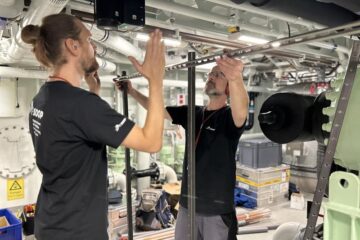Promising new drug treats and protects against radiotherapy-associated oral mucositis

In some cancer patients treated with radiation, the mouth sores known as oral mucositis become so severe that feeding tubes are required for nutrition and narcotics are needed for pain. In fact, 40-70 percent of patients treated with upper-body radiation develop the condition to some degree.
Currently, there is no FDA approved treatment. A University of Colorado Cancer Center study published this week in the journal Nature Medicine takes an important step toward changing that.
“We developed a genetically engineered mouse that produces a protein called Smad7 in the surface layers of its mouth. With this protein expressed, mouse models were dramatically more resistant to the development of oral mucositis than were controls,” says Xiao-Jing Wang, PhD, CU Cancer Center investigator and John S. Gates endowed Chair of Cancer Stem Cell Biology at the Charles C. Gates Center for Regenerative Medicine and Stem Cell Biology.
Wang and collaborators including Qinghong Zhang, PhD, Yosef Refaeli, PhD, and radiation oncologist David Raben, MD, are pursuing further research with the goal of developing Smad7 as a therapeutic agent for human oral mucositis. For example, the group joined Smad7 in with a short peptide that allows the protein to cross through cell membranes, and produced this combination protein from cultured bacteria. When they applied the engineered compound directly to the mouse oral cavity, it both protected against the development of oral mucositis and worked to heal existing ulcers. Importantly, it revived wounded normal cells but not cancer cells, avoiding a major problem of growth factors currently used to promote the cell growth that heals ulcers.
“It’s very reasonable to hope that this line of research will result in a drug that patients can self-administer topically to oral mucositis sores, or use to prevent them altogether, thus significantly improving the quality of life for many cancer patients,” Wang ways.
Additionally, Wang points out that the mouse model engineered to develop human-like oral mucositis in the presence of radiation treatment is a useful tool for studying the disease – offering opportunities to search for biomarkers and test experimental therapies.
This work was supported in part by NIH grants AR061792, DE015953, R01CA115468, R03DA033982, P30CA046934, & the Bioscience Discovery and Evaluation Grant program (BDEG) by The State of Colorado and University of Colorado Technology Transfer Office.
Media Contact
More Information:
http://www.ucdenver.eduAll latest news from the category: Health and Medicine
This subject area encompasses research and studies in the field of human medicine.
Among the wide-ranging list of topics covered here are anesthesiology, anatomy, surgery, human genetics, hygiene and environmental medicine, internal medicine, neurology, pharmacology, physiology, urology and dental medicine.
Newest articles

Cruise Ship as Data Collector
New Approaches in Ocean Observation… Scientific research – not only confined to dedicated research vessels but also from non-scientific vessels and marine infrastructures. This is one of the ideas promoted…

Experiment opens door for millions of qubits on one chip
Researchers from the University of Basel and the NCCR SPIN have achieved the first controllable interaction between two hole spin qubits in a conventional silicon transistor. The breakthrough opens up…

Economies take off with new airports
A global study by an SUTD researcher in collaboration with scientists from Japan explores the economic benefits of airport investment in emerging economies using nighttime satellite imagery. Be it for…





















